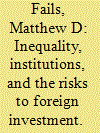| Srl | Item |
| 1 |
ID:
167435


|
|
|
|
|
| Summary/Abstract |
Oil wealth tends to impede democracy, but scholars disagree about both why and under what conditions. This note helps answer these questions by evaluating the field's foundational theory of the rentier state, which claims that oil wealth finances generous societal benefits that reduce citizens’ demands for representation and hinder the emergence of democratic regimes. I create a new measure of such benefits, focusing specifically on the size of domestic gasoline subsidies in dollars per capita. I then use a global sample from 1990 through 2014 to demonstrate that greater spending on these subsidies significantly reduces the likelihood of a transition toward democracy. The impact on democratization is as consequential in practical terms as are large increases in the rate of economic growth. Moreover, including the measure of fuel subsidies helps account for the autocratic effect of oil income. I conclude by highlighting how this fuel subsidy data can shed light on a number of other political economy questions.
|
|
|
|
|
|
|
|
|
|
|
|
|
|
|
|
| 2 |
ID:
118158


|
|
|
|
|
| Publication |
2012.
|
| Summary/Abstract |
Income inequality is frequently given a central role in explaining diverse political outcomes, but the specifics of how, when, and under what circumstances inequality really matters are far from clear. This paper addresses these questions by examining whether greater levels of inequality raise the risk of expropriation associated with foreign investment. The results demonstrate that inequality matters in two distinct ways. First, inequality elevates risk, although consistent with the argument developed herein, the effect is strongest when chief executives face high constraints on their decision making. Second, inequality mitigates the otherwise protective influence of political institutions on the risk of expropriation. The findings are robust across a variety of estimation strategies, including instrumental variable procedures that correct for error in the measurement of inequality. The findings provide new insights regarding the determinants of foreign investment while simultaneously resolving one part of the contested literature describing inequality's role in the political economy of development.
|
|
|
|
|
|
|
|
|
|
|
|
|
|
|
|